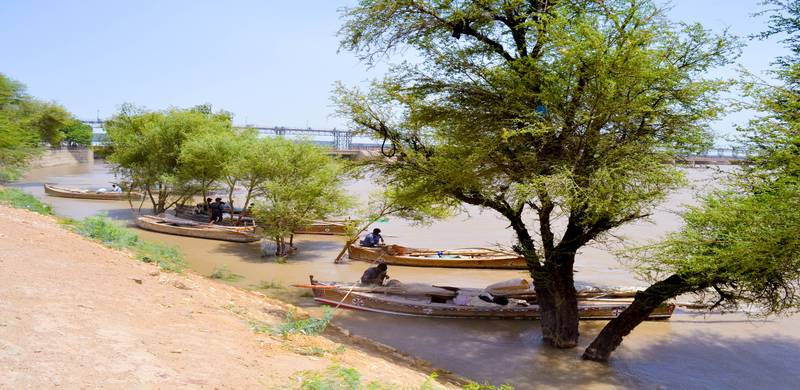
Courtesy thethirdpole.net
As the government is seeking to build dams along the River Indus to overcome the water shortage, fears among fishermen and delta communities along the river are rising.
The current water shortage reminds these fishermen of the Water Apportionment Accord signed in 1991 between Pakistan’s four provinces.
Unfortunately, the 10 MAF established by the accord was not followed, and resultantly, a water shortage developed in the River Indus. Due to the water shortage, various species of fish vanished. This water shortage also reduced the size of the miyans, a Sindhi word for a fishing point on the river bank. Fishermen have testified that since the 1991 accord, water does not reach the Indus delta.
One such village, Sonn Miyan, has been drying up for 10 years. There has been no heavy flood in the past two decades. Moreover, influential landlords from upper Sindh suck up the water with lift machines, leaving fishing villages in the lower areas of Sindh without much water.
The Indus River System Authority has not provided Sindh its due share of water. A fisherman from Sonn Miyan said that the shortage of water had ruined them and they had lost their livelihood, adding that they did not even have drinking water and their well had gone dry.
The fisherman added that previously they could fish for 200 kilometres along the banks of Indus, but now their boats lied anchored on the bank. He further said that the fishermen are now forced to compete with wealthy fish farmers and have to bring fish from fish farms to sell in the market.
“It is quite strange for a fisherman not to catch fish from the river and to turn to the fish farm,” he stated.
The region’s marginalisation has further been increased due to the lack of infrastructure; Sonn Miyan also lacks basic health units, schools and roads.
Chairman of the Pakistan Fisherfolk Forum stated that the Indus River was not a commodity but a living entity. “You cannot chain a river through dams. This is a controlled river which does not reach the end, so it is dying,” he added.
He added that there was a need to rehabilitate the Indus river as it was the right of the river.
As the government is seeking to build dams along the River Indus to overcome the water shortage, fears among fishermen and delta communities along the river are rising.
The current water shortage reminds these fishermen of the Water Apportionment Accord signed in 1991 between Pakistan’s four provinces.
According to the accord, a minimum escapage of water was set to check sea intrusion. The optimum level of 10 million acre-feet (MAF) for the escapage was put forth by the Sindh province.
Unfortunately, the 10 MAF established by the accord was not followed, and resultantly, a water shortage developed in the River Indus. Due to the water shortage, various species of fish vanished. This water shortage also reduced the size of the miyans, a Sindhi word for a fishing point on the river bank. Fishermen have testified that since the 1991 accord, water does not reach the Indus delta.
One such village, Sonn Miyan, has been drying up for 10 years. There has been no heavy flood in the past two decades. Moreover, influential landlords from upper Sindh suck up the water with lift machines, leaving fishing villages in the lower areas of Sindh without much water.
The Indus River System Authority has not provided Sindh its due share of water. A fisherman from Sonn Miyan said that the shortage of water had ruined them and they had lost their livelihood, adding that they did not even have drinking water and their well had gone dry.
The fisherman added that previously they could fish for 200 kilometres along the banks of Indus, but now their boats lied anchored on the bank. He further said that the fishermen are now forced to compete with wealthy fish farmers and have to bring fish from fish farms to sell in the market.
“It is quite strange for a fisherman not to catch fish from the river and to turn to the fish farm,” he stated.
The region’s marginalisation has further been increased due to the lack of infrastructure; Sonn Miyan also lacks basic health units, schools and roads.
Chairman of the Pakistan Fisherfolk Forum stated that the Indus River was not a commodity but a living entity. “You cannot chain a river through dams. This is a controlled river which does not reach the end, so it is dying,” he added.
He added that there was a need to rehabilitate the Indus river as it was the right of the river.
